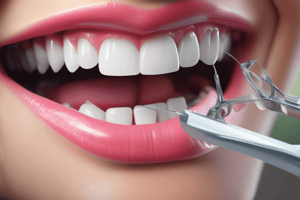Podcast
Questions and Answers
What supports the vertical height of the face?
What supports the vertical height of the face?
- Posterior teeth (correct)
- Front teeth
- TMJ
- Dental arches
What is the term for the loss of facial height due to the loss of posterior teeth?
What is the term for the loss of facial height due to the loss of posterior teeth?
- Posterior bite collapse (correct)
- Occlusal stabilization
- TMJ dysfunction
- Anterior bite collapse
What can tooth loss lead to on the opposite side of the dental arch?
What can tooth loss lead to on the opposite side of the dental arch?
- Bilateral mastication
- Unilateral mastication (correct)
- Periodontal problems
- Normal mastication
What is one of the reasons for treating tooth loss?
What is one of the reasons for treating tooth loss?
What happens to the front teeth when the posterior teeth are lost?
What happens to the front teeth when the posterior teeth are lost?
What can happen to the mandible due to tooth loss?
What can happen to the mandible due to tooth loss?
What can tooth loss lead to on the affected side of the dental arch?
What can tooth loss lead to on the affected side of the dental arch?
What is necessary to correct the disturbed occlusal plane?
What is necessary to correct the disturbed occlusal plane?
What is one of the effects of posterior bite collapse?
What is one of the effects of posterior bite collapse?
Why is it important to maintain dental arches?
Why is it important to maintain dental arches?
Flashcards are hidden until you start studying
Study Notes
Prosthodontics (Prosthetic Dentistry or Prosthodontia)
- Prosthodontics is a dental specialty that focuses on restoring and maintaining oral functions, comfort, appearance, and health of patients by creating artificial replacements for missing parts of the mouth and jaw.
Branches of Prosthodontics
- Fixed Prosthodontics (FPDs)
- Removable Prosthodontics
- Complete Denture
- Removable Partial Denture (RPDs)
- Implant Prosthodontics
- Maxillofacial Prosthodontics
Fixed Prosthodontics (Crown & Bridge Prosthodontics)
- Deals with restoring damaged teeth with artificial crowns and replacing missing natural teeth with a dental prosthesis permanently cemented in place (Fixed Partial Denture)
- Types of Fixed Prostheses
- Extracoronal: restorations that seat over the tooth (e.g., crown restorations, direct/indirect veneer restoration)
- Intracoronal: restorations that seat inside the tooth (e.g., inlay, onlay, pinlage)
The Crown
- A fixed extracoronal artificial restoration for the coronal portion of a natural tooth
- Must restore morphology, function, and contour of the damaged portion of a tooth and protect the remaining tooth structure from further damage
- Classifications
- According to coverage area
- Complete crown: covers the coronal portion of the tooth (e.g., full metal crown, all-ceramic crown)
- Partial crown: covers part of the coronal portion of the tooth (e.g., 3/4 crown, 7/8 crown)
- Complete replacement: replaces the natural crown entirely (e.g., post crown)
- According to materials used
- Metal crowns (e.g., gold alloy and its alternatives)
- Non-metal crowns (e.g., acrylic resin, zirconium, porcelain as in jacket crown)
- Combination of metal and plastic materials (e.g., PFM crown restorations)
- According to coverage area
Fixed Partial Denture (Bridge)
- A fixed dental prosthesis that replaces and restores function and aesthetics of one or more missing natural teeth
- Components
- Retainer: the part that seats over (or in) the abutment tooth, connecting the pontic to the abutment (can be major or minor retainer, crown, inlay, post & core)
- Pontic: the suspended member that replaces the missing tooth or teeth, occupying the position of the missing natural tooth
- Connector: the part that joins the individual components of the bridge together (retainer & pontics), can be fixed (rigid) or movable (flexible)
Definitions (Terminology)
- Abutment: a tooth to which a bridge is attached
- Span: the space between natural teeth that is to be filled by pontics
- Saddle: the area of the edentulous ridge over which the pontic lies
- Pier: an abutment standing between two abutments & supporting two pontics, each pontic being attached to a further abutment
- Unit: Pontic + Retainer, when applied to bridgework, means either a retainer or a pontic
- Path of Insertion: an imaginary line along which the restoration can be inserted and removed without any interferences or causing lateral force on the abutment
Why Do a Fixed Partial Denture?
- To maintain the balance of forces exerted on individual teeth
- Consequences of not replacing a single tooth:
- Super eruption of the opposing tooth or teeth
- Gingival recession
- Traumatic occlusion or lacking of bite
- Loss of bony support for that tooth
- Loss of the proximal contact
- To prevent:
- Loss of function on the affected side
- Tilting (drifting) of the adjacent teeth
- Periodontal problem & mobility
Posterior Bite Collapse
- The loss of posterior teeth causing the face to lose height and close down
- Effects:
- Generalized collapse of lower & upper dental arches
- Premature contact causing deviation in the normal movement of the mandible, leading to TMJ dysfunction & muscle spasm
- Tooth loss leading to unilateral mastication on the opposite side of the dental arch, resulting in periodontal problems, caries on the affected side
- Posterior bite collapse putting pressure on the front teeth, causing them to move or splay forward
General Effects of Tooth Loss
- Generalized collapse of lower & upper dental arches
- Premature contact causing deviation in the normal movement of the mandible, leading to TMJ dysfunction & muscle spasm
- Tooth loss leading to unilateral mastication on the opposite side of the dental arch, resulting in periodontal problems, caries on the affected side
- Posterior bite collapse putting pressure on the front teeth, causing them to move or splay forward
Reasons for Treating Tooth Loss
- Aesthetic
- Function (ability to eat)
- Pain due to TMJ dysfunction & muscle spasm
- Maintenance of dental arch (occlusal stabilization & prevent tilting)
- Speech (particularly lower incisors)
Studying That Suits You
Use AI to generate personalized quizzes and flashcards to suit your learning preferences.





